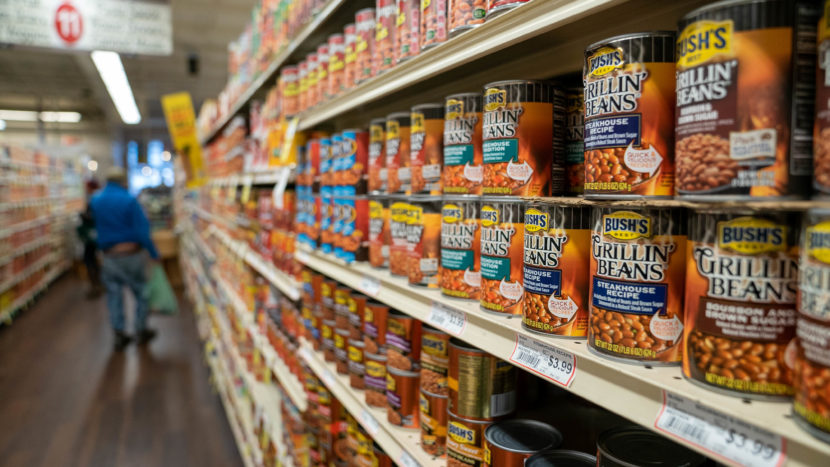
The temperature in Soldotna has been dipping below zero at night, but Jo Lunstedt says she has had to skip paying her electricity bill to feed her family.
“I applied for benefits back on Oct. 27 of 2022. And as of today’s date, I still have not heard anything from them,” she said. “I have to make my food stretch longer. So, we don’t have seconds.”
Lunstedt is one of thousands of Alaskans caught in a backlog for processing food stamp applications, known as Supplemental Nutrition Assistance Benefits, or SNAP.
Alaska Department of Health Commissioner Heidi Hedberg said the problem goes back months, and her staff doesn’t expect it to improve any time soon.
Meanwhile, Alaskans from Anchorage to Nome say they’re choosing between paying bills or buying food. Some are skipping meals so their children have enough to eat.
“We’re working with the tools we have”
Hedberg says the department is hiring more people to process applications, but it will likely be months before hungry households have relief.
“We hear their frustration, we want them to have their benefits. We’re working with the tools we have,” Hedberg said.
It was only after multiple requests for comment from KTOO — and the publication of an initial story — that the department broke its silence about the delay. Applicants were left in the dark, too.
Kabrina Field got so hungry for answers that she called the offices of Gov. Mike Dunleavy and her state senator, Mia Costello. She said after the call to her senator she got a call back from the Department of Public Assistance.
“They were telling me that it will take 90 to 120 days before they even process my recertification. And they said that was the best they could do. And we’ve got to truck through with no food,” she said.
She and her three children haven’t gotten their food stamps since October. She’s been relying on friends, family and food banks.
“I have to keep my bills going,” Field said. “There’s no ifs, ands or buts. But as far as Christmas goes, it’s going to be very small. Very, very, very small.”
Staff shortage and cyber-attack slow benefits
The state usually recertifies families who receive SNAP benefits every six months, but that wasn’t required for the last two years during the COVID-19 pandemic. Alaskans had to refile their paperwork when the public health emergency lifted in June.
Division of Public Assistance Director Shawnda O’Brien says that led to a huge volume of applications at once — 8,000 in August. She noticed her department was falling behind and requested more staff.
“Our staff had to be retrained because many of the staff hadn’t been doing this for the last couple of years,” O’Brien said.
Hedberg says lingering effects from the cyber-attack on the health department in May of 2021 compounded the problem because the department has to rely on more manual paperwork.
The department’s own reporting from November shows that it’s processing only about a third of SNAP recertifications in a timely manner.
“We don’t want to see anyone go without food,” O’Brien said. “We definitely feel the pressure and have been working. Everyone has been working to find solutions.”
The state is in the process of onboarding 33 new staff, and O’Brien has requested 40 more. She said 30 positions are currently vacant.
In the interim, she said the department is devoting more time to processing applications, including a full day each week on Wednesdays. She said staff members who don’t usually process eligibility have been put on the job.
But the division is still processing applications from September. Hedberg says there’s a dedicated team working on those applications, while another team focuses on applications from October. Another team is processing current applicants.
O’Brien estimated the state has 8,000 cases to review, including 1,700 from September and 2,000 from October.
“I’m probably not going to see significant changes until maybe, you know, a couple months from now,” she said.
She recommended that people in immediate need call 211, the number for the United Way, a nonprofit that connects Alaskans with services.
A flood of complaints
There’s another resource if Alaskans feel the state isn’t holding up its part of the social contract: the ombudsman’s office.
It reviews complaints about state agency programs, like SNAP. It’s nonpartisan, independent and objective.
Alaska State Ombudsman Kate Burkhart said her office is investigating the complaints about the Division of Public Assistance.
“This year, today, we have received over 180 complaints related to delays, lack of communication, lack of adequate information, related to public assistance benefits,” she said.
She added that there is a deja vu quality to the complaints — her office investigated the Division of Public Assistance in 2018 related to reports of delays and lack of adequate communication.
Their report found that increasing staff would go a long way to solve the problem. The state did, and complaints dropped significantly for a few years.
“In 2021, we only received 83 complaints,” she said. “We are not quite done with 2022 and it looks like we’re probably going to see three times that.”
More than 80% of the complaints have come in since the state began recertifying SNAP recipients in July. She said in the last two weeks her office has gotten about three complaints a day.
Burkhart said she can’t fix the slowdown, but her office is working with the state. And it might be able to help people who are desperate in the meantime.
“If you have a problem and you have no idea what to do, you can call us,” she said.
The health department also offered some advice to help recertification paperwork go through more smoothly: try to submit the application in the middle of the month, double-check to make sure the application is complete and do not file the same application more than once.
Alaskans will receive retroactive benefits once they are approved, meaning people who sent in paperwork for a September recertification will get all the payments that were due, even if they come several months late.
